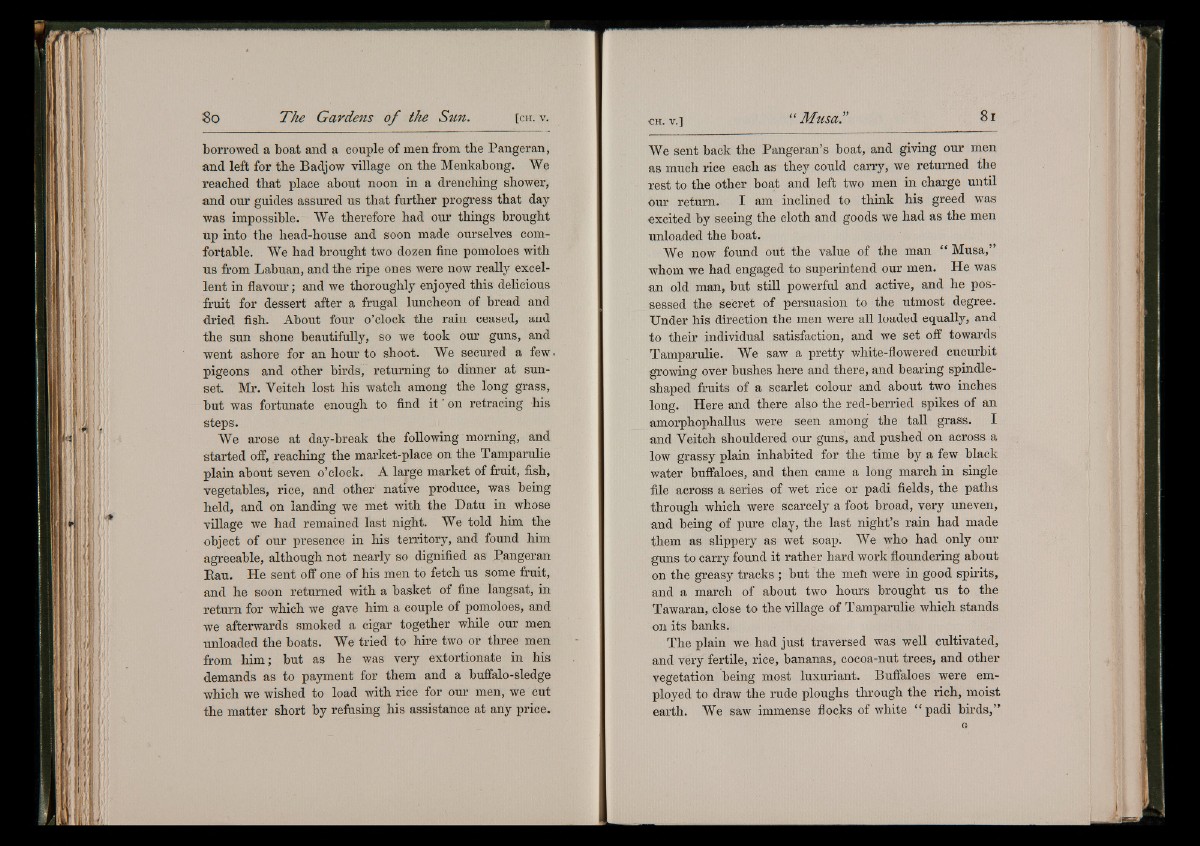
borrowed a boat and a couple of men from the Pangeran,
and left for the Badjow village on the Menkabong. We
reached that place about noon in a drenching shower,
and our guides assured us that further progress that day
was impossible. We therefore had our things brought
up into the head-house and soon made ourselves comfortable.
We had brought two dozen fine pomoloes with
us from Labuan, and the ripe ones were now really excellent
in flavour; and we thoroughly enjoyed this delicious
fruit for dessert after a frugal luncheon of bread and
dried fish. About four o’clock the rain ceased, and
the sun shone beautifully, so we took our guns, and
went ashore for an hour to shoot. We secured a few
pigeons and other birds, returning to dinner at sunset.
Mr. Yeitch lost his watch among the long grass,
but was fortunate enough to find i t ' on retracing his
steps.
We arose at day-break the following morning, and
started off, reaching the market-place on the Tamparulie
plain about seven o’clock. A large market of fruit, fish,
vegetables, rice, and other native produce, was being
held, and on landing we met with the Datu in whose
village we had remained last night. We told him the
object of our presence in his territory, and found him
agreeable, although not nearly so dignified as Pangeran
Rau. He sent off one of his men to fetch us some fruit,
and he soon returned with a basket of fine langsat, in
return for which we gave him a couple of pomoloes, and
we afterwards smoked a cigar together while our men
unloaded the boats. We tried to hire two or three men
from him; but as he was very extortionate in his
demands as to payment for them and a buffalo-sledge
which we wished to load with rice for our men, we cut
the matter short by refusing his assistance at any price.
We sent back the Pangeran’s boat, and giving our men
as much rice each as they could carry, we returned the
rest to the other boat and left two men in charge until
our return. I am inclined to think his greed was
excited by seeing the cloth and goods we had as the men
unloaded the boat.
We now found out the value of the man “ Musa,”
whom we had engaged to superintend our men. He was
an old man, but still powerful and active, and he possessed
the secret of persuasion to the utmost degree.
Under his direction the men were all loaded equally, and
to their individual satisfaction, and we set off towards
Tamparulie. We saw a pretty white-flowered cucurbit
growing over bushes here and there, and bearing spindle-
shaped fruits of a scarlet colour and about two inches
long. Here and there also the red-berried spikes of an
amorphophallus were seen among the tall grass. I
and Yeitch shouldered our guns, and pushed on across a
low grassy plain inhabited for the time by a few black
water buffaloes, and then came a long march in single
file across a series of wet rice or padi fields, the paths
through which were scarcely a foot broad, very uneven,
and being of pure clay, the last night’s rain had made
them as slippery as wet soap. We who had only our
guns to carry found it rather hard work floundering about
on the greasy tracks ; but the men were in good spirits,
and a march of about two hours brought us to the
Tawaran, close to the village of Tamparulie which stands
on its banks.
The plain we had just traversed was well cultivated,
and very fertile, rice, bananas, cocoa-nut trees, and other
vegetation being most luxuriant. Buffaloes were employed
to draw the rude ploughs through the rich, moist
earth. We saw immense flocks of white “ padi birds,”